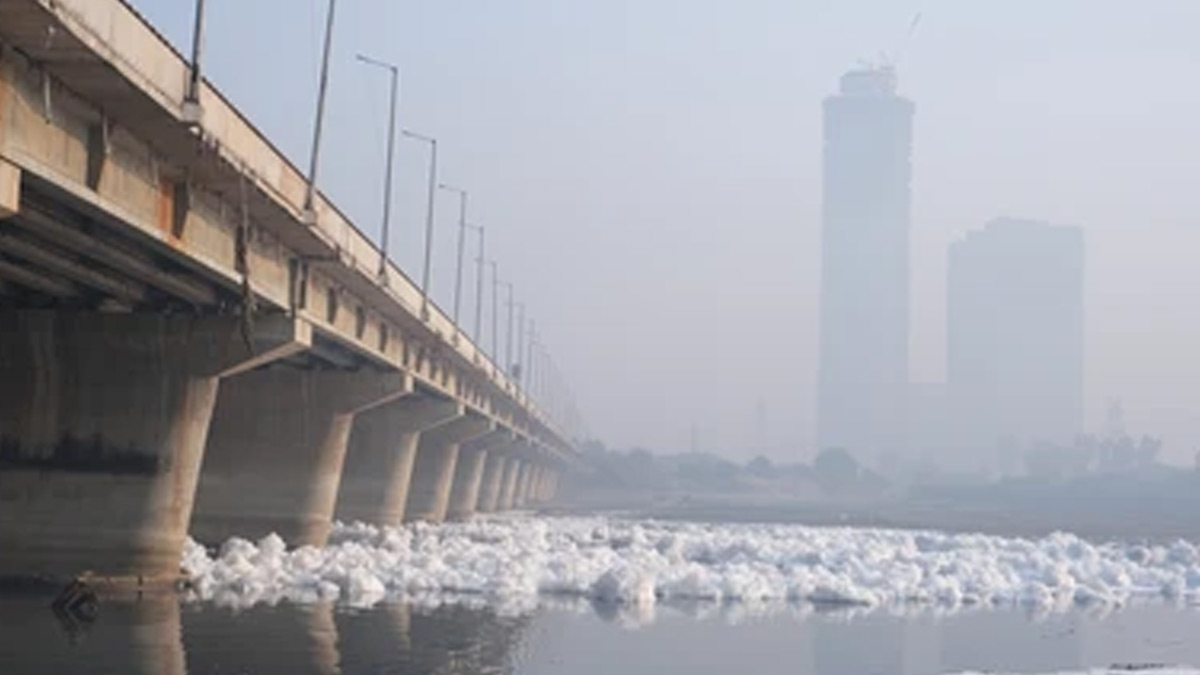
A thick layer of froth has engulfed the Yamuna River in Delhi, raising alarms about increasing pollution levels. Environmental experts are sounding the alarm on the dangers posed by this frothy layer, primarily caused by pollutants like ammonia and phosphates from untreated sewage and industrial waste. With major festivals like Chhath Puja around the corner, this situation is a cause for concern not just for environmentalists but also for the health and safety of the people who live nearby.
Table of Content:-
Understanding Froth Formation

According to a recent study done on Yamuna river, froth formation occurs due to high concentrations of organic pollutants, particularly ammonia and phosphates. These pollutants often come from untreated sewage and industrial effluents, which find their way into the river system. When these substances react with the river water, they create bubbles that accumulate, forming a thick layer of froth on the surface.
In the case of the Yamuna, the situation has been exacerbated by the lack of flooding this year, which typically helps to dilute and wash away pollutants. Instead, harmful substances have accumulated, leading to the frothy layer recently drawing attention. The froth, which is visibly seen in videos circulating on social media, indicates a deeper environmental problem that requires urgent action.
Potential Health Risks
To understand potential health risks caused due to the thick froth in Yamuna river, OnlyMyHealth interacted with Dr (Prof) Amit Kumar Sharma, Head of Department and Senior Consultant in ENT, Cochlear Implant and Voice Disorders, Shalby Sanar International Hospitals, Gurugram, and Dr Manish Itolikar, Consultant Physician, Fortis Hospital, Mulund, Mumbai.
Emphasising the serious health risks posed by the frothy water, Dr Amit Kumar Sharma said, "The froth on the Yamuna poses serious health risks, particularly concerning respiratory and skin issues,” adding, "Exposure to this frothy water, especially for those who may come into contact with it during festive celebrations, can lead to a range of health complications."
Respiratory issues: According to Dr Sharma, exposure to the toxic froth can lead to respiratory problems such as asthma, bronchitis, and other chronic respiratory diseases. "Inhalation of aerosolised pollutants can exacerbate these conditions, particularly in individuals with pre-existing respiratory issues."

Skin irritations and infections: Direct contact with the frothy water can cause skin irritations, rashes, and infections. "Chemicals and pathogens present in the polluted water can penetrate the skin, leading to conditions like dermatitis or fungal infections," warns Dr Manish Itolikar.
Gastrointestinal problems: If individuals inadvertently ingest water from the river while bathing or participating in rituals, they may face gastrointestinal issues such as diarrhoea, nausea, or vomiting. "Contaminated water can harbour harmful bacteria and viruses that pose serious health risks," Dr Sharma adds.
Allergic reactions: As per Dr Itoliakr, the presence of various pollutants can trigger allergic reactions, resulting in symptoms like itching, hives, or swelling, particularly in sensitive individuals. "Such reactions can vary in severity, potentially requiring medical attention," he notes.
Long-term health effects: Chronic exposure to the pollutants found in the frothy water may lead to long-term health consequences, including organ damage or increased cancer risk. Dr Sharma highlights that some pollutants can accumulate in the body over time, causing significant health issues down the line.
Also read: Delhi Air Pollution: 6 Major Health Impacts of High AQI Level
Challenge of Celebrating Chhath Puja

As major festivals like Chhath Puja approach, the risk of exposure to this toxic froth increases. Traditionally, many people immerse themselves in the Yamuna during these celebrations, raising concerns about the potential health hazards they may face. The festival, dedicated to the sun god and involving rituals performed in the water, makes it crucial for authorities to address the froth problem promptly.
In response to the alarming situation, the ruling Aam Aadmi Party (AAP) has stated that the Delhi government is closely monitoring the condition of the river. Engineers have been deployed to oversee the barrages at Okhla and Agra Canal, ensuring that authorities receive regular updates with photographs of the river's condition. However, experts argue that these temporary measures, such as sprinkling defoamers on the froth, will not adequately address the long-term pollution crisis plaguing the Yamuna.
Environmentalists emphasise the urgent need for better waste management and stricter regulation of industrial discharges to prevent such incidents from recurring. As the festive season approaches, it is imperative that concerted efforts are made to clean up the river and protect the health of those who celebrate along its banks.
Also watch this video
How we keep this article up to date:
We work with experts and keep a close eye on the latest in health and wellness. Whenever there is a new research or helpful information, we update our articles with accurate and useful advice.
Current Version